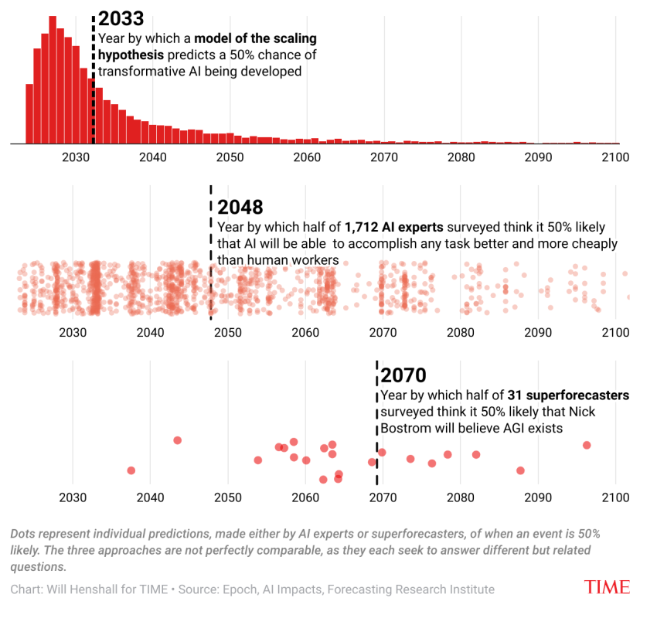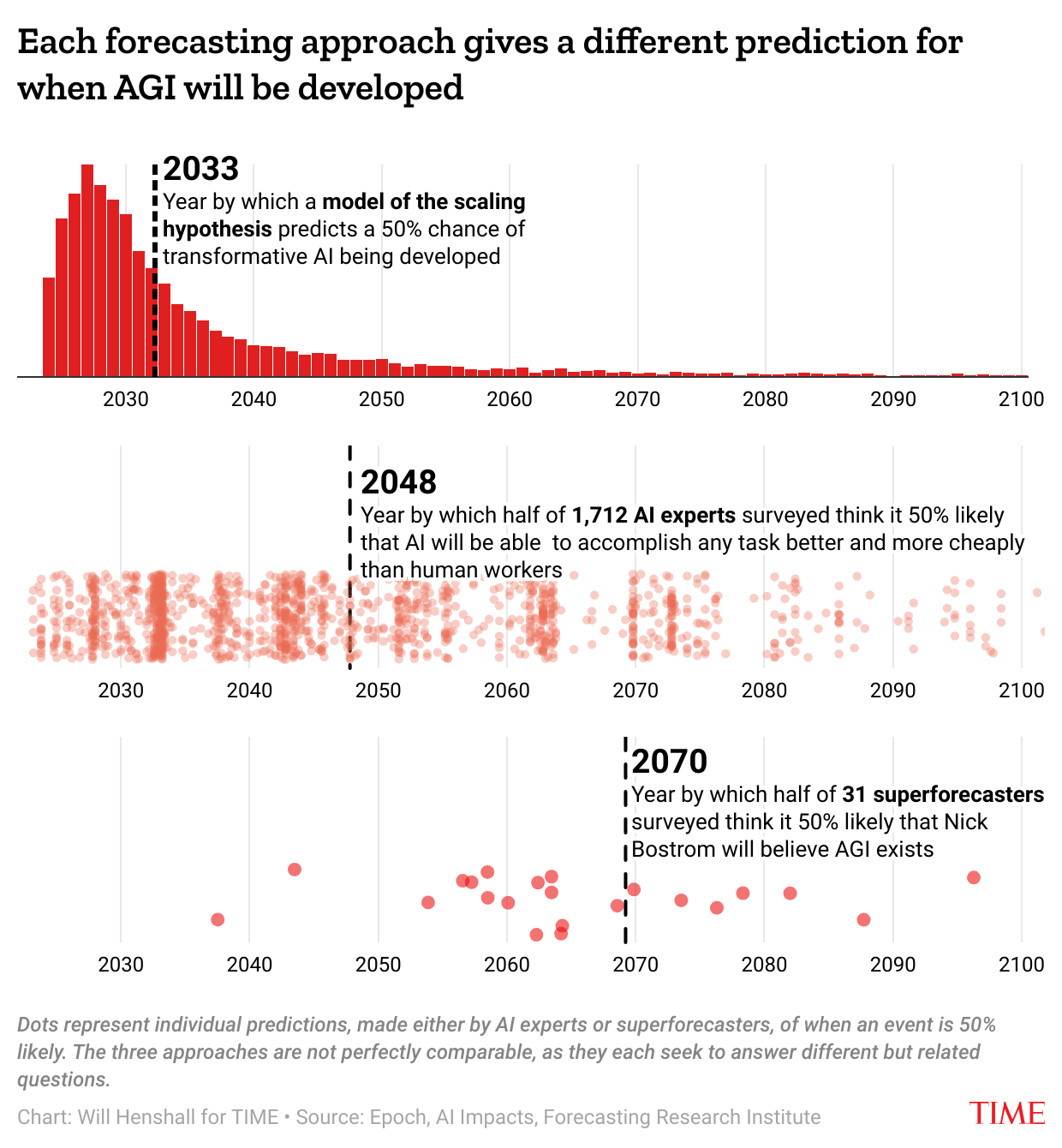
Mar 24, 2024 #ai#artificialintelligence#newtechnologyAGI is Coming! Here’s What Will Happen When It Arrives 🔒 Keep Your Digital Life Private and Be Safe Online: https://nordvpn.com/safetyfirst Are you curious about the future of artificial general intelligence (AGI)? Get ready to explore the exciting possibilities in this video! AGI, or artificial general intelligence, is a groundbreaking technology that promises to revolutionize our world. In this video, we’ll delve into what exactly AGI is and what we can expect when it finally arrives. Firstly, let’s break down what AGI actually means. AGI refers to a form of artificial intelligence that possesses human-like cognitive abilities. Unlike narrow AI systems that are designed for specific tasks, AGI aims to emulate the broad range of cognitive abilities seen in humans. This includes reasoning, problem-solving, learning, and even creativity. Imagine a future where machines can think and learn just like humans – that’s the promise of AGI. So, what will happen when AGI arrives? The implications are vast and far-reaching. On one hand, AGI has the potential to bring about incredible advancements in various fields, from healthcare to transportation. With its ability to process vast amounts of data and make complex decisions, AGI could revolutionize industries and solve some of the most pressing challenges facing humanity. However, the arrival of AGI also raises important questions and concerns. From ethical dilemmas to potential job displacement, there are many factors to consider as we navigate the transition to a world with AGI. In this video, we’ll explore these issues in depth and discuss how society can prepare for the arrival of AGI while maximizing its benefits and mitigating its risks. In conclusion, the advent of AGI heralds a new era of possibilities and challenges. By understanding what AGI is and what it could mean for our future, we can better prepare ourselves for the exciting journey ahead. Join us as we dive into the fascinating world of artificial general intelligence and explore what lies ahead when AGI arrives. #ai#artificialintelligence#newtechnology Subscribe for more! *************************** Welcome to AI Uncovered, your ultimate destination for exploring the fascinating world of artificial intelligence! Our channel delves deep into the latest AI trends and technology, providing insights into cutting-edge AI tools, AI news, and breakthroughs in artificial general intelligence (AGI). We simplify complex concepts, making AI explained in a way that is accessible to everyone. At AI Uncovered, we’re passionate about uncovering the most captivating stories in AI, including the marvels of ChatGPT and advancements by organizations like OpenAI. Our content spans a wide range of topics, from science news and AI innovations to in-depth discussions on the ethical implications of artificial intelligence. Our mission is to enlighten, inspire, and inform our audience about the rapidly evolving technology landscape. Whether you’re a tech enthusiast, a professional seeking to stay ahead of AI trends, or someone curious about the future of artificial intelligence, AI Uncovered is the perfect place to expand your knowledge. Join us as we uncover the secrets behind AI tools and their potential to revolutionize our world. Subscribe to AI Uncovered and stay tuned for enlightening content that bridges the gap between AI novices and experts, covering AI news, AGI, ChatGPT, OpenAI, artificial intelligence, and more. Together, let’s explore the limitless possibilities of technology and AI. Disclaimer: Some links included in this description might be affiliate links. If you purchase a product or service through the links that we provide, we may receive a small commission. There is no additional charge for you. Thank you for supporting AI Uncovered so we can continue to provide you with free, high-quality content. ___________________________ 🌟 Contact: ai.uncovered.ai@gmail.com
Mar 26, 2024 #LLM #Largelanguagemodel #chatgpt
✉️ Join My Weekly Newsletter – https://mailchi.mp/6cff54ad7e2e/theai… 🐤 Follow Me on Twitter https://twitter.com/TheAiGrid 🌐 Checkout My website – https://theaigrid.com/ Links From Todays Video: Elon Musks STUNNING New AGI Prediciton (AGI By 2025) Welcome to my channel where i bring you the latest breakthroughs in AI. From deep learning to robotics, i cover it all. My videos offer valuable insights and perspectives that will expand your knowledge and understanding of this rapidly evolving field. Be sure to subscribe and stay updated on my latest videos. Was there anything i missed? (For Business Enquiries) contact@theaigrid.com #LLM #Largelanguagemodel #chatgpt #AI #ArtificialIntelligence #MachineLearning #DeepLearning #NeuralNetworks #Robotics #DataScience
In this episode, recorded during the 2024 Abundance360 Summit, Peter and Elon discuss super-intelligence, the future of AI, Neuralink, and more. Elon Musk is a businessman, founder, investor, and CEO. He co-founded PayPal, Neuralink and OpenAI; founded SpaceX, and is the CEO of Tesla and the Chairman of X. Learn more about Abundance360: https://www.abundance360.com/summit ———– This episode is supported by exceptional companies: Use my code PETER25 for 25% off your first month’s supply of Seed’s DS-01® Daily Synbiotic: https://seed.com/moonshots Get started with Fountain Life and become the CEO of your health: https://fountainlife.com/peter/ ———– Topics: 0:00 – INTRO 1:01 – The Power and Perils of Superintelligence 10:43 – The Future of Artificial Intelligence 15:29 – AD: Boost Gut Health With DSO 16:58 – Neuralink: Merging Humans with Technology 22:43 – Possibilities for Life on Mars 24:31 – A Step Closer to Multiplanetary Life 27:39 – Making a Dent in Society’s Imagination ——————————————– I send weekly emails with the latest insights and trends on today’s and tomorrow’s exponential technologies. Stay ahead of the curve, and sign up now: https://www.diamandis.com/subscribe My new book with Salim Ismail, Exponential Organizations 2.0: The New Playbook for 10x Growth and Impact, is now available on Amazon: https://bit.ly/3P3j54J Get my new Longevity Practices book for free: https://www.diamandis.com/longevity Connect with Peter: Twitter: https://bit.ly/40JYQfK Instagram: https://bit.ly/3x6UykS Listen to the show: Apple: https://apple.co/3wLXeV3 Spotify: https://spoti.fi/3DwLzgs

https://time.com/6556168/when-ai-outsmart-humans/
Who’s right?
All three approaches to predicting when AGI might be developed—Epoch’s model of the scaling hypothesis, and the expert and superforecaster surveys—have one thing in common: there’s a lot of uncertainty. In particular, the experts are spread widely, with 10% thinking it’s as likely as not that AGI is developed by 2030, and 18% thinking AGI won’t be reached until after 2100.
Still, on average, the different approaches give different answers. Epoch’s model estimates a 50% chance that transformative AI arrives by 2033, the median expert estimates a 50% probability of AGI before 2048, and the superforecasters are much further out at 2070.

There are many points of disagreement that feed into debates over when AGI might be developed, says Katja Grace, who organized the expert survey as lead researcher at AI Impacts. First, will the current methods for building AI systems, bolstered by more compute and fed more data, with a few algorithmic tweaks, be sufficient? The answer to this question in part depends on how impressive you think recently developed AI systems are. Is GPT-4, in the words of researchers at Microsoft, the sparks of AGI? Or is this, in the words of philosopher Hubert Dreyfus, “like claiming that the first monkey that climbed a tree was making progress towards landing on the moon?”
Second, even if current methods are enough to achieve the goal of developing AGI, it’s unclear how far away the finish line is, says Grace. It’s also possible that something could obstruct progress on the way, for example a shortfall of training data.
Finally, looming in the background of these more technical debates are people’s more fundamental beliefs about how much and how quickly the world is likely to change, Grace says. Those working in AI are often steeped in technology and open to the idea that their creations could alter the world dramatically, whereas most people dismiss this as unrealistic.
The stakes of resolving this disagreement are high. In addition to asking experts how quickly they thought AI would reach certain milestones, AI Impacts asked them about the technology’s societal implications. Of the 1,345 respondents who answered questions about AI’s impact on society, 89% said they are substantially or extremely concerned about AI-generated deepfakes and 73% were similarly concerned that AI could empower dangerous groups, for example by enabling them to engineer viruses. The median respondent thought it was 5% likely that AGI leads to “extremely bad,” outcomes, such as human extinction.
Given these concerns, and the fact that 10% of the experts surveyed believe that AI might be able to do any task a human can by 2030, Grace argues that policymakers and companies should prepare now.
Preparations could include investment in safety research, mandatory safety testing, and coordination between companies and countries developing powerful AI systems, says Grace. Many of these measures were also recommended in a paper published by AI experts last year.
“If governments act now, with determination, there is a chance that we will learn how to make AI systems safe before we learn how to make them so powerful that they become uncontrollable,” Stuart Russell, professor of computer science at the University of California, Berkeley, and one of the paper’s authors, told TIME in October.
MORE MUST-READS FROM TIME
- Biden’s Campaign Is In Trouble. Will the Turnaround Plan Work?
- Why We’re Spending So Much Money Now
- The Financial Influencers Women Actually Want to Listen To
- Breaker Sunny Choi Is Heading to Paris
- The UAE Is on a Mission to Become an AI Power
- Why TV Can’t Stop Making Silly Shows About Lady Journalists
- The Case for Wearing Shoes in the House
- Want Weekly Recs on What to Watch, Read, and More? Sign Up for Worth Your Time
WRITE TO WILL HENSHALL AT WILL.HENSHALL@TIME.COM
Many experts think it is likely that AGI will be developed in the coming decades, although individual predictions vary greatly. Jan 19, 2024

https://time.com/6556168/when-ai-outsmart-humans/
JANUARY 19, 2024 1:44 PM EST
In 1960, Herbert Simon, who went on to win both the Nobel Prize for economics and the Turing Award for computer science, wrote in his book The New Science of Management Decision that “machines will be capable, within 20 years, of doing any work that a man can do.”
History is filled with exuberant technological predictions that have failed to materialize. Within the field of artificial intelligence, the brashest predictions have concerned the arrival of systems that can perform any task a human can, often referred to as artificial general intelligence, or AGI.
So when Shane Legg, Google DeepMind’s co-founder and chief AGI scientist, estimates that there’s a 50% chance that AGI will be developed by 2028, it might be tempting to write him off as another AI pioneer who hasn’t learnt the lessons of history.
https://imasdk.googleapis.com/js/core/bridge3.629.1_en.html#goog_2140004325
0 seconds of 15 secondsVolume 0%
Still, AI is certainly progressing rapidly. GPT-3.5, the language model that powers OpenAI’s ChatGPT was developed in 2022, and scored 213 out of 400 on the Uniform Bar Exam, the standardized test that prospective lawyers must pass, putting it in the bottom 10% of human test-takers. GPT-4, developed just months later, scored 298, putting it in the top 10%. Many experts expect this progress to continue.
BRANDED CONTENTThe Duhons rebuild lives after disaster. Hear their inspiring story.BY ALLY FINANCIAL
Read More: 4 Charts That Show Why AI Progress Is Unlikely to Slow Down
Legg’s views are common among the leadership of the companies currently building the most powerful AI systems. In August, Dario Amodei, co-founder and CEO of Anthropic, said he expects a “human-level” AI could be developed in two to three years. Sam Altman, CEO of OpenAI, believes AGI could be reached sometime in the next four or five years.
But in a recent survey the majority of 1,712 AI experts who responded to the question of when they thought AI would be able to accomplish every task better and more cheaply than human workers were less bullish. A separate survey of elite forecasters with exceptional track records shows they are less bullish still.
The stakes for divining who is correct are high. Legg, like many other AI pioneers, has warned that powerful future AI systems could cause human extinction. And even for those less concerned by Terminator scenarios, some warn that an AI system that could replace humans at any task might replace human labor entirely.
The scaling hypothesis
Many of those working at the companies building the biggest and most powerful AI models believe that the arrival of AGI is imminent. They subscribe to a theory known as the scaling hypothesis: the idea that even if a few incremental technical advances are required along the way, continuing to train AI models using ever greater amounts of computational power and data will inevitably lead to AGI.
There is some evidence to back this theory up. Researchers have observed very neat and predictable relationships between how much computational power, also known as “compute,” is used to train an AI model and how well it performs a given task. In the case of large language models (LLM)—the AI systems that power chatbots like ChatGPT—scaling laws predict how well a model can predict a missing word in a sentence. OpenAI CEO Sam Altman recently told TIME that he realized in 2019 that AGI might be coming much sooner than most people think, after OpenAI researchers discovered the scaling laws.
Read More: 2023 CEO of the Year: Sam Altman
Even before the scaling laws were observed, researchers have long understood that training an AI system using more compute makes it more capable. The amount of compute being used to train AI models has increased relatively predictably for the last 70 years as costs have fallen.
Early predictions based on the expected growth in compute were used by experts to anticipate when AI might match (and then possibly surpass) humans. In 1997, computer scientist Hans Moravec argued that cheaply available hardware will match the human brain in terms of computing power in the 2020s. An Nvidia A100 semiconductor chip, widely used for AI training, costs around $10,000 and can perform roughly 20 trillion FLOPS, and chips developed later this decade will have higher performance still. However, estimates for the amount of compute used by the human brain vary widely from around one trillion floating point operations per second (FLOPS) to more than one quintillion FLOPS, making it hard to evaluate Moravec’s prediction. Additionally, training modern AI systems requires a great deal more compute than running them, a fact that Moravec’s prediction did not account for.
More recently, researchers at nonprofit Epoch have made a more sophisticated compute-based model. Instead of estimating when AI models will be trained with amounts of compute similar to the human brain, the Epoch approach makes direct use of scaling laws and makes a simplifying assumption: If an AI model trained with a given amount of compute can faithfully reproduce a given portion of text—based on whether the scaling laws predict such a model can repeatedly predict the next word almost flawlessly—then it can do the work of producing that text. For example, an AI system that can perfectly reproduce a book can substitute for authors, and an AI system that can reproduce scientific papers without fault can substitute for scientists.
Some would argue that just because AI systems can produce human-like outputs, that doesn’t necessarily mean they will think like a human. After all, Russell Crowe plays Nobel Prize-winning mathematician John Nash in the 2001 film, A Beautiful Mind, but nobody would claim that the better his acting performance, the more impressive his mathematical skills must be. Researchers at Epoch argue that this analogy rests on a flawed understanding of how language models work. As they scale up, LLMs acquire the ability to reason like humans, rather than just superficially emulating human behavior. However, some researchers argue it’s unclear whether current AI models are in fact reasoning.
Epoch’s approach is one way to quantitatively model the scaling hypothesis, says Tamay Besiroglu, Epoch’s associate director, who notes that researchers at Epoch tend to think AI will progress less rapidly than the model suggests. The model estimates a 10% chance of transformative AI—defined as “AI that if deployed widely, would precipitate a change comparable to the industrial revolution”—being developed by 2025, and a 50% chance of it being developed by 2033. The difference between the model’s forecast and those of people like Legg is probably largely down to transformative AI being harder to achieve than AGI, says Besiroglu.
Asking the experts
Although many in leadership positions at the most prominent AI companies believe that the current path of AI progress will soon produce AGI, they’re outliers. In an effort to more systematically assess what the experts believe about the future of artificial intelligence, AI Impacts, an AI safety project at the nonprofit Machine Intelligence Research Institute, surveyed 2,778 experts in fall 2023, all of whom had published peer-reviewed research in prestigious AI journals and conferences in the last year.
Among other things, the experts were asked when they thought “high-level machine intelligence,” defined as machines that could “accomplish every task better and more cheaply than human workers” without help, would be feasible. Although the individual predictions varied greatly, the average of the predictions suggests a 50% chance that this would happen by 2047, and a 10% chance by 2027.
Like many people, the experts seemed to have been surprised by the rapid AI progress of the last year and have updated their forecasts accordingly—when AI Impacts ran the same survey in 2022, researchers estimated a 50% chance of high-level machine intelligence arriving by 2060, and a 10% chance by 2029.
The researchers were also asked when they thought various individual tasks could be carried out by machines. They estimated a 50% chance that AI could compose a Top 40 hit by 2028 and write a book that would make the New York Times bestseller list by 2029.
MORE MUST-READS FROM TIME
- Biden’s Campaign Is In Trouble. Will the Turnaround Plan Work?
- Why We’re Spending So Much Money Now
- The Financial Influencers Women Actually Want to Listen To
- Breaker Sunny Choi Is Heading to Paris
- The UAE Is on a Mission to Become an AI Power
- Why TV Can’t Stop Making Silly Shows About Lady Journalists
- The Case for Wearing Shoes in the House
- Want Weekly Recs on What to Watch, Read, and More? Sign Up for Worth Your Time
WRITE TO WILL HENSHALL AT WILL.HENSHALL@TIME.COM
https://desirelovell.tumblr.com/



TikTok @desirelovell2022 🔥💗💻🖥️ #desirelovell 🤍 🌸⌨️🤖YouTube @desirelovell I do work at Mercedes-Benz (as a Sales Representative) – BUT All Opinions Expressed on This Channel Are My Own and Do Not Reflect Necessarily Those of My Employer – Mercedes-Benz of Little Rock 8 Colonel Glenn Plaza Dr. Little Rock, AR 72210 dlovell@winrockautomotive.com Cell: 501-650-4844 Dealership: 501-666-9457 https://linktr.ee/desirelovell
DESIREE LOVELL at MERCEDES-BENZ of Little Rock #benzsociety #gle #amg #s #mercedesbenz #w #coupe #mercedes #g #glc #c #glecoupe #e #brabus #samg #mercedesamg #mercedesgle #scoupe #ml #cls #amggt #happynewyear #amgcoupe #v #newyearseve #cars #firworks #amgpower #cla
To the desirelovell.com Admin! my name’s Eric and for just a second, imagine this…
– Someone does a search and winds up at desirelovell.com.
– They hang out for a minute to check it out. I’m interested… but… maybe…
– And then they hit the back button and check out the other search results instead.
– Bottom line – you got an eyeball, but nothing else to show for it.
– There they go.
This isn’t really your fault – it happens a LOT – studies show 7 out of 10 visitors to any site disappear without leaving a trace.
But you CAN fix that.
Web Visitors Into Leads is a software widget that’s works on your site, ready to capture any visitor’s Name, Email address and Phone Number. It lets you know right then and there – enabling you to call that lead while they’re literally looking over your site.
CLICK HERE https://rushleadgeneration.com to try out a Live Demo with Web Visitors Into Leads now to see exactly how it works.
Time is money when it comes to connecting with leads – the difference between contacting someone within 5 minutes versus 30 minutes later can be huge – like 100 times better!
Plus, now that you have their phone number, with our new SMS Text With Lead feature you can automatically start a text (SMS) conversation… so even if you don’t close a deal then, you can follow up with text messages for new offers, content links, even just how you doing? notes to build a relationship.
Strong stuff.
CLICK HERE https://rushleadgeneration.com to discover what Web Visitors Into Leads can do for your business.
You could be converting up to 100X more leads today!
Eric
PS: Web Visitors Into Leads offers a FREE 14 days trial – and it even includes International Long Distance Calling.
You have customers waiting to talk with you right now… don’t keep them waiting.
CLICK HERE https://rushleadgeneration.com to try Web Visitors Into Leads now.
If you’d like to unsubscribe click here https://rushleadgeneration.com/unsubscribe.aspx?d=desirelovell.com
I’ll look at that thanks